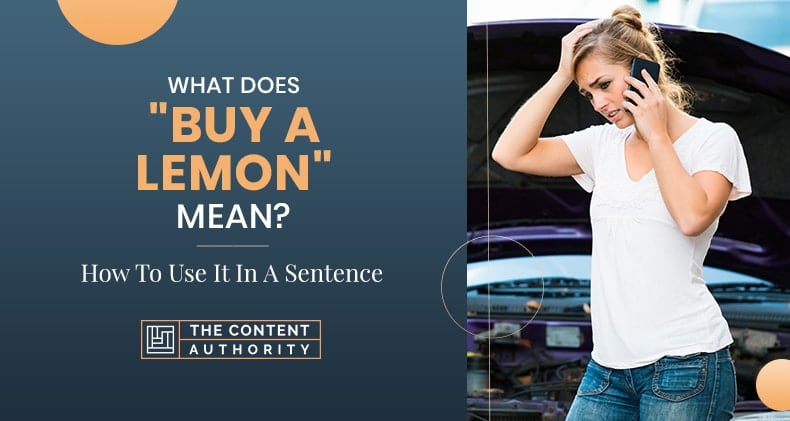Have you ever bought a second-hand car to save some money? Just to get that car giving you problems the second you drive it? Some people might say you “bought a lemon,” but what does that mean anyway? If you want to know more, keep reading this article.
“Buy a lemon” means wasting money on something broken, unsatisfactory, worthless. It also refers to something that has less value than we thought. Most of the time, people use it to talk about a car that gives problems right away after you bought it.
There is no doubt that cars with defects are a lot of trouble, but how did they end up being called a “lemon”? In this article, we will be discussing the possible origins of this phrase, its uses, and examples. We will see a little bit of the “Lemon Law,” how to spot a lemon car, and what to do in case you have one.
Origins
The exact origin of “Buy a Lemon” is unknown. But there are several theories about the origin of the use of “lemon” to talk about a bad or unsatisfactory item, especially when it comes to cars.
Some say it is the face you make when you taste a lemon; others will tell you a little more about the history behind the meaning. But one of the theories is the one that stuck the slang “lemon car” to our vocabulary.
The Layers Of A Lemon And The Face

There is a theory that says that a car is like a lemon, a new car that looks good, shiny, and perfect for you. But once you “bite the lemon,” you get your mouth full of its sour and bitter juice. You are referring to the car not functioning properly.
This theory is related to another one that says a lemon and a “lemon car” make people do the same facial expression. Can you imagine a person with their car on the side of the road stuck with some big issue? Now imagine another person biting a lemon; they probably will make the same face.
Early XX Century Slangs
There are two theories about the origin of “Buying a Lemon” being at the beginning of the 1900s.
The first one says that back in the days, the word “lemon” was an American Slang that was used to refer to a person who was a “loser, or simpleton,” like a lemon. Meaning the car has defects and is worthless.
The other one says the word “lemon” meant “hustle.” This refers to a person who has been hustled, or has been taken advantage of, will make the same face as if they have eaten, well… you know, a lemon.
Volkswagen Ad
At the beginning of the 1960s, most people were already calling defective cars “lemon” or “lemon car.” But it was Volkswagen who stuck that meaning in our vocabulary; this was when they released an ad using the word “lemon” on it.
The ad was a simple picture of a Beetle, and the word “Lemon” was marked underneath. This positioned the car as a premium product because it passed the rigorous final inspection process. The slogan for this marketing campaign was “We pluck the lemons; you get the plums.” referring to only one out of 50 cars was discarded at the final inspection.
How To Use It

To “Buy a Lemon” is used as an idiom or slang; this functions as a verb, or you can use only the word “Lemon” when you are just talking about the car. Keeping in mind, we use this idiom to talk only about vehicles in bad condition.
Examples
- I think Sara just bought a lemon; the car sounds weird every time she speeds up.
- With that little money, Peter will buy a lemon instead of a nice car.
- Her car turned out to be a lemon, but she couldn’t afford to change it.
- No one wants to buy a lemon that breaks down for good after less than 50,000 miles. – (USA Today)
- I hope you don’t end up buying a lemon.
Lemon Law

In many countries, there is a law that compensates buyers of “lemon cars,” and it is referred to as the Lemon Law. This protects car owners but also motorized vehicles, such as motorcycles and trucks.
In the U.S., it is also known as the Magnuson Moss Warranty Federal Trade Commission Improvements Act. This law is a state law, meaning that most states have their own “Lemon Law.”
While this law is not the same in all states, it requires the auto manufacturer to repurchase a vehicle that has a significant problem.
The Lemon Law considers the nature of the problem, the number of days the car will not be available for the owner, and the number of repair attempts made.
If the manufacturer does not meet all the demands, they become obligated to repurchase the defective vehicle. This rule does not apply to dealerships, as they are not the ones offering the warranty.
In some states, this law only covers certain types of vehicles. For example, in some cases, it will just cover vehicles bought for individual use but not for business use. Besides this, some states have a limited Lemon Law that covers used cars. New York is one of the few states with used car lemon law.
How To Spot The Lemon Between The Plums
This is a three step process, but not all of them are as simple as they sound.
- Look for the Vehicle’s History Report
Try to get the Title Status (be careful with the Salvage Status), Accident History, Owner History, Repair History, and any Safety Recalls. This way, you can spot any significant problems or possible failures.
- Test Drive and Look for any Red Flags
Inspecting the car is probably the best way to spot an obvious lemon car.
- Keep in mind to look at every little detail and check the color of the smoke once the car is turned on.
- Touch and rub everything; make sure there are no metal flakes or weird textures.
- The smell is important; if you get a musky scent, it indicates water damage. An acidic or burning smell could tell there is a problem with the engine.
- Listen, pay attention to every sound; this way, you may spot an engine or transmission problem.
- Get a Pre-Purchase Inspection
Once the car has passed the first inspection you made, take it to a professional. If there is a problem during the inspection, you can ask the seller to deduct the cost of the repairs from the price. This inspection might cost you around $100.
What To Do If Life Gives You a Lemon Car
You will have to prepare a lot of paperwork.
Keeping all the records of the car is always a good idea, even more, if you need to prove that your car is a lemon—secure copies of receipts, work orders of any repairs. Also, do some research and look for other drivers that are having the same issue as you. You can do this by looking for the identification number of your car using the Carfax Vehicle Recall Check page and the National Highway Traffic Safety Administration (NHTSA) website.
Follow The Rules and Look For An Attorney
The first thing you need to do is take the vehicle to the dealer for repairs; if you skip this, you might void the warranty. Then you will have to write a formal letter to the company expressing your claim about the vehicle and the possible remedy for it. If the claim gets denied, you will have to decide whether you would like to proceed with the arbitration process or not.
The Magnuson Moss Warranty Federal Trade Commission Improvements Act encourages companies to have an informal dispute-resolution program to deal with warranty problems. If the company does have one, you will have to go through an arbitrary dispute before going to court.
Going to court should be your last resort, or if there are some questions about the fairness of the arbitration process. Getting rid of a defective car is challenging. Even if you win, you have to keep in mind you might have to spend years pursuing that claim.
More Fun Idioms
Conclusion
If you buy a used car, you have to be extra careful during the shopping process. You might not notice that the car is a lemon car from a test drive.
Look for reviews from owners of the same car to spot any potential defect that could become a major problem. Also, check the title as some cars might be branded as “lemon” or even use a different language to say it.
You can also try to find any words or sentences that might be a red flag in the description of the car.
There is no doubt that buying a lemon can be a bit of a problem; you might have been there before. So next time life gives you lemons, keep in mind to check if it is not a car.
Shawn Manaher is the founder and CEO of The Content Authority. He’s one part content manager, one part writing ninja organizer, and two parts leader of top content creators. You don’t even want to know what he calls pancakes.

